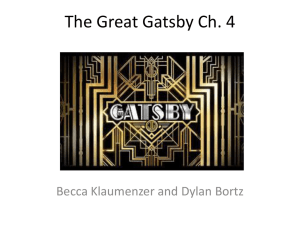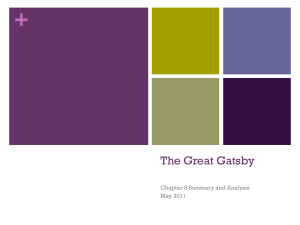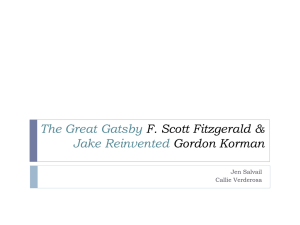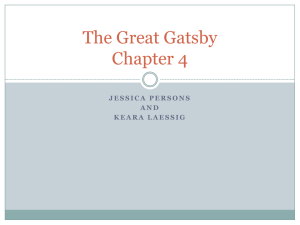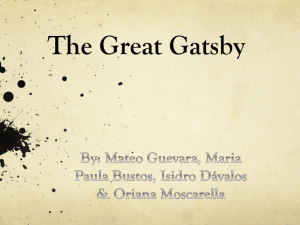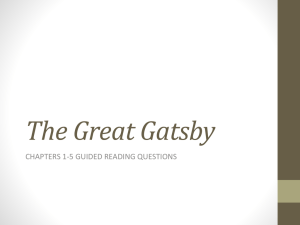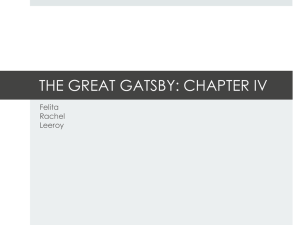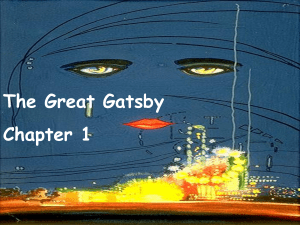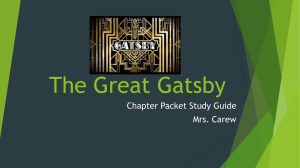File
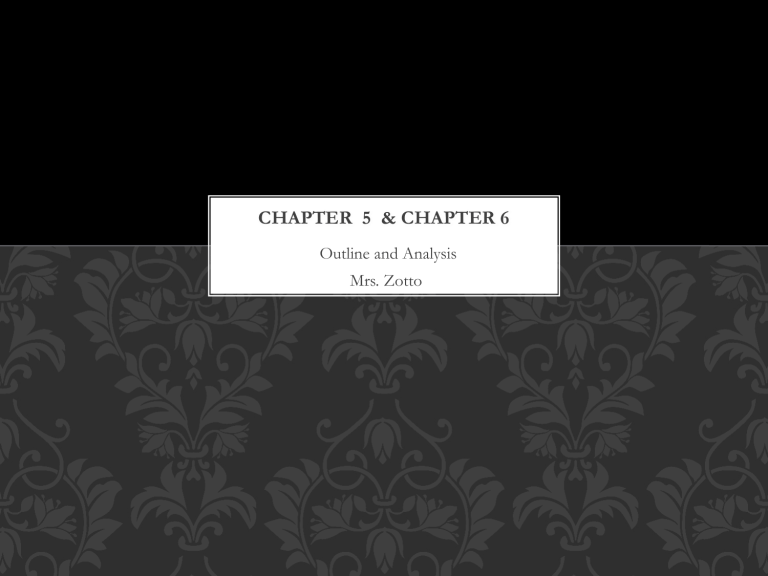
CHAPTER 5 & CHAPTER 6
Outline and Analysis
Mrs. Zotto
CHAPTER 5 OUTLINE
• When Nick arrives home after his talk with Jordan, Gatsby is waiting for him, excited to find out if
Nick will go forth with the plan.
• Gatsby offers Nick the opportunity to make some money on the side… and promises that he will not have anything to do with Meyer Wolfsheim.
• Nick is uninterested and explains to Gatsby he is just too busy. He also accepts Gatsby plan in having Daisy over for tea.
• Nick is slightly offended that Gatsby wants to pay him for arranging the meeting with Daisy and refuses Gatsby’s offers, but he still agrees to call Daisy and invite her to his house.
• Nick is slightly offended that Gatsby wants to pay him for arranging the meeting with Daisy and refuses
Gatsby’s offers, but he still agrees to call Daisy and invite her to his house.
CHAPTER 5 OUTLINE
• On the big day, Gatsby is all nervous. He's afraid that she's not coming, that the food isn't right, that the sky is too blue, etc.
• When Daisy gets there, as usual, we hear all about her voice and how special and excited it is.
Nick tries to leave the two alone for a minute but even the silence in the room gives off an awkward feeling, so he joins them again.
• Gatsby gives Nick the old "can I see you for a minute?" and in the other room flips out about how badly things are going.
• Nick suggests Daisy might feel less uncomfortable were they NOT speaking about her in clearly audible tones in the next room doesn't really live up to the past ideals.
CHAPTER 5
• While Daisy is powdering her nose, Nick and Gatsby look with awe on
Gatsby's house. Gatsby slips up a little when he says it took him three years to earn the money for it, and when Nick questions his earlier statement that he inherited the money, Gatsby gets suddenly defensive.
• As they explore Gatsby's house, Nick thinks he hears the ghostly laughter of the owl-eyed man in the library.
• It becomes painfully obvious that Gatsby only has such a fine house and such fine things for the purpose of impressing Daisy.
CHAPTER 5 OUTLINE
• When Daisy sees Gatsby's collection of expensive shirts, she cries about how beautiful they are.
• Nick muses that, since Daisy is now here with Gatsby, the green light loses its magical mystery significance. The present, it seems, doesn't really live up to the past ideals.
• OK, this is important: While they're inspecting his house, Gatsby explains that a large framed picture is one Mr. Dan Cody, supposedly an "old friend." ( Remember: Mr. Dan Cody).
• They go downstairs and have this man Klipspringer play "The Love Nest" on the piano.
• Nick heads home, leaving Gatsby and Daisy alone together.
CHAPTER 5 OUTLINE
• Chapter 5 is the pivotal chapter of The Great Gatsby, as Gatsby’s reunion with
Daisy is the hinge on which the novel swings. Before this event, the story of their relationship exists only in prospect, as Gatsby moves toward a dream that no one else can discern.
• Afterward, the plot shifts its focus to the romance between Gatsby and Daisy, and the tensions in their relationship actualize themselves. After Gatsby’s history with Daisy is revealed, a meeting between the two becomes inevitable, and it is highly appropriate that the theme of the past’s significance to the future is evoked in this chapter.
• As the novel explores ideas of love, excess, and the American dream, it becomes clearer and clearer to the reader that Gatsby’s emotional frame is out of sync with the passage of time. His nervousness about the present and about how Daisy’s attitude toward him may have changed causes him to knock over
Nick’s clock, symbolizing the clumsiness of his attempt to stop time and retrieve the past.
CHAPTER 5 ANALYSIS
• Gatsby’s character throughout his meeting with Daisy is at its purest and most revealing. The theatrical quality that he often projects falls away, and for once all of his responses seem genuine.
• He forgets to play the role of the Oxford-educated socialite and shows himself to be a love-struck, awkward young man. Daisy, too, is moved to sincerity when her emotions get the better of her.
• Before the meeting, Daisy displays her usual sardonic humor; when Nick invites her to tea and asks her not to bring Tom, she responds, “Who is
‘Tom’?” Yet, seeing Gatsby strips her of her superficial appearance. When she goes to Gatsby’s house, she is overwhelmed by honest tears of joy at his success and sobs upon seeing his piles of expensive English shirts.
CHAPTER 5 ANALYSIS
• One of the main qualities that Nick claims to possess, along with honesty, is tolerance. On one level, his arrangement of the meeting brings his practice of tolerance almost to the level of complicity—just as he tolerantly observes Tom’s merrymaking with Myrtle, so he facilitates the commencement of an extramarital affair for Daisy, potentially helping to wreck her marriage.
• Ironically, all the while Nick is disgusted by the moral decay that he witnesses among the rich in New York. However, Nick’s actions may be at least partially justified by the intense and sincere love that Gatsby and
Daisy clearly feel for each other, a love that Nick perceives to be absent from Daisy’s relationship with Tom.
CHAPTER 5 ANALYSIS
• In this chapter, Gatsby’s house is compared several times to that of a feudal lord, and his imported clothes, antiques, and luxuries all display a nostalgia for the lifestyle of a British aristocrat. Though Nick and Daisy are amazed and dazzled by Gatsby’s splendid possessions, a number of things in Nick’s narrative suggest that something is not right about this transplantation of an aristocrat’s lifestyle into democratic America.
• For example, Nick notes that the brewer who built the house in which Gatsby now lives tried to pay the neighboring villagers to have their roofs thatched, to complement the style of the mansion. They refused, Nick says, because
Americans are stubbornly and unwilling to play the role of peasants.
CHAPTER 5
ANALYSIS
• Thomas Jefferson and the other founding fathers envisioned America as a place that would be free of the injustices of class and caste, a place where people from humble backgrounds would be free to try to improve themselves economically and socially. Chapter 5 suggests that this dream of improvement, carried to its logical conclusion, results in a superficial imitation of the old European social system that America left behind.
• BRAINSTORM : Do you think that United States (present) is more of what the founding father’s envisioned in America?
CHAPTER 5
IN CLASS ACTIVITY
Get into groups answer one of the following questions:
Go over the responses at the end of the period
CASE 1
Look closely at the meeting of Nick and Daisy in this chapter paying particular attention to the mood and tone of the passage. Now re-write the passage from the perspective of a stranger looking in on the two people, unaware of who they are, but conveying the meaning of the conversation by describing their body language and facial expressions.
CHAPTER 5
IN CLASS ACTIVITY
CASE 2
On page 86 Nick remarks that ‘Americans while willing, even eager, to be Serfs have always been obstinate about peasantry’ and that Gatsby’s mansion has a ‘feudal silhouette’. Define what each of these statements might mean.
Thinking about what you know about why people moved from
Europe to America, what do you think that Fitzgerald is trying to say about the European legacy that prevails in American high society?
CHAPTER 6
Outline and Analysis
CHAPTER 6 OUTLINE
• Reporter inspired by the feverish gossip about Gatsby is circulating in New
York, comes to West Egg in hopes of obtaining the true story of his past from him.
• Gatsby turns the man away; however, Nick interrupts the narrative to relate to Gatsby’s past (the truth of which he only learned much later) to the reader.
• Gatsby’s real name is James Gatz. He was born on an impoverish farm in
North Dakota, rather than into wealth in San Francisco as he claimed.
• Gatsby changed his name to Jay Gatsby at the age of Seventeen.
• He attended St Olaf ’s, a small college in Minnesota; he dropped out after two week, and could not bear working as a janitor in order to pay his tuition.
• Gatsby’s dream of self-improvement was only intensified by his relationship with Dan Cody, a man whom he met while working as a fisherman on Lake
Superior.
• Cody was fifty, a self-made millionaire who had made his fortune during
The Yukon Gold Rush
CHAPTER 6
OUTLINE
• Cody took Gatsby in and made the young man his personal assistant. On their subsequent voyages to the West Indies and the Barbary Coast, Gatsby became even more passionately covetous of wealth and privilege.
• When Cody died, Gatsby inherited $25,000; he was unable to claim it; however due to the malicious intervention of Cody’s mistress Ella
Kaye. Afterward, Gatsby vowed to become a success in his own right.
• Several Weeks pass without Nick visiting Gatsby. Upon visiting Gatsby at his mansion, Nick is shocked to find Tom Buchanan there. Tom has unexpectedly stopped for a drink at Gatsby’s after an afternoon of horseback riding; he is accompanied by Mr. and Mrs. Sloan, an insufferable East Egg couple who exemplify everything that is repellent about the “old rich”.
CHAPTER 6
• Mr. and Mrs. Sloane an insufferable East Egg couple who exemplify everything that is repellent about the “old rich”.
• Gatsby invites the group to supper, but Mrs. Sloan hastily refuses; perhaps ashamed of her own rudeness.
• She half-heartedly offers Gatsby and Nick an invitation to dine at her home.
• Nick recognizes the insincerity of her offer, declines; Gatsby accepts, though it is unclear whether his gesture is truly obvious or defiant.
CHAPTER 6
• Tom pointedly complains about the crazy people that Daisy meets, presumably referring to Gatsby. Throughout the awkward afternoon, he is contemptuous of Gatsby, particularly mocking his acceptance of Mrs. Sloane’s disingenuous invitation.
• The following Saturday, Tom and Daisy attend ones of Gatsby’s parties. Tom, predictably, is unpleasant and rude throughout the evening. After the Buchanans leave, Gatsby is torn at the thought that Daisy did not have a good time.
CHAPTER 6
• Gatsby does not yet know that Tom badly upset her by telling her that
Gatsby made his fortune in bootlegging.
• Nick realizes that Gatsby wants Daisy to tell Tom that she never loved him.
• Nick gently informs Gatsby that he cannot ask too much of Daisy, and said “You can’t repeat the past”.
Gatsby spiritedly replies:
“Of course you can!”
CHAPTER 6 ANALYSIS
It is significant that Gatsby leaves college because he finds his work as a janitor degrading. This seems a perverse decision, given the fact that a university education would dramatically improve his social standing.
His decision to leave reveals Gatsby's extreme sensitivity to class, and to the fact of his own poverty; from his childhood onward, he longs for wealth and for the sophistication and elegance which he imagines that wealth will lend him. His work as a janitor is a gross humiliation because it is at odds with his ideal of himself; to protect that ideal, he is willing to damage his actual circumstances.
CHAPTER 6 ANALYSIS
Nick begins the story of Gatsby's past by saying that Gatsby "sprang from his Platonic conception of himself," which refers to that his ideal form. That is, the Platonic form of an object is the perfect form of that object. Therefore, Nick is suggesting that Gatsby has modeled himself on an idealized version of "Jay Gatsby": he is striving to be the man he envisions in his fondest dreams of himself. Gatsby is thus the novel's representative of the American Dream, and the story of his youth borrows on one of that dream's oldest myths: that of the self-made man.
CHAPTER 6 ANALYSIS
Fitzgerald uses the character of Dan Cody to subtly suggest that the America of the
1920s is no longer a place where selfmade men can thrive.
Cody, like Gatsby, transcended early hardship to become a millionaire. Like Gatsby, he is remarkably generous to his friends and subordinates. Cody takes to drinking because, despite his wealth, he remains unable to carve out a place for himself in the world of 1920s
America. It is important to note that Cody's death is brought about, at least in part, through the treachery of the woman he loves; this foreshadows the circumstances of
Gatsby's death in Chapter VIII.
CHAPTER 6 ANALYSIS
The painfully awkward luncheon party at Gatsby's mansion underlines the hostility of the American 1920s toward the figure of the self-made man. Both the Sloanes and Tom Buchanan treat Gatsby with contempt and condescension, because he is not of the long-standing American upper class.
Though Gatsby is fabulously wealthy, perhaps wealthier than Tom himself, he is still regarded as socially inferior. For Fitzgerald, nothing could be more inimical to the original ideals of America. The first Americans fought to escape the tyrannies of the European nobility; Tom Buchanan longs to
reproduce them.
CHAPTER 6 ANALYSIS
This chapter makes it clear that Daisy, too, is a part of the same narrowminded aristocracy that produced her husband. For Gatsby, she became the symbol of everything that he wanted to possess: she is the epitome of wealth and sophistication.
Gatsby loves this quality in Daisy, it is precisely because she is an aristocrat that she cannot possibly fulfill his dreams. She would never sacrifice her own class status in order to be with him. Her love for him pales in comparison to her love of privilege.
